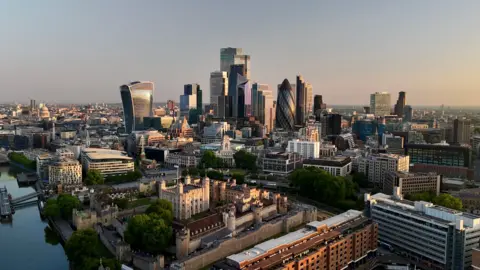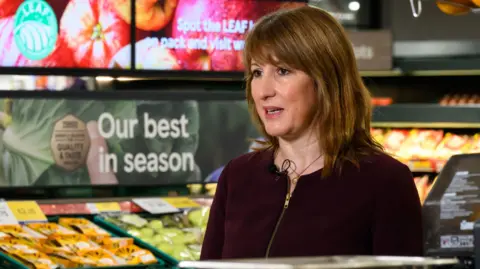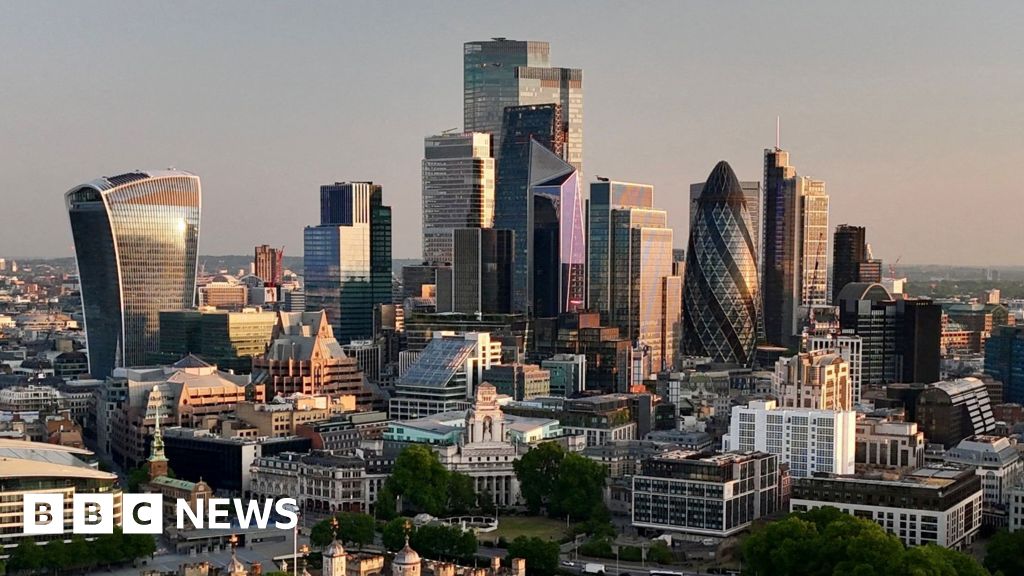Simon JackBusiness editor
 Reuters
ReutersBusiness leaders face a nervous final few days before the chancellor’s second Budget, having borne the brunt of a brutal set of tax hikes this time last year.
Firms are still reeling from those: the £25bn National Insurance increase and an inflation-busting rise in the minimum wage.
Confidence in boardrooms has grown increasingly fragile as the Budget nears. Almost all measures of sentiment among chief executives and finance bosses in the last six months have shown alarm bells ringing.
So what can nervous business owners and leaders expect from Rachel Reeves?
We are certain taxes will rise, and that takes money out of the economy. Research firm Capital Economics estimates the Budget will knock 0.2% off GDP in 2026 – a meaningful hit to an economy that only grew 0.1% in the third quarter of this year.
However, as the chancellor pulls money out of the economy, the Bank of England is likely to push money back in by lowering interest rates, encouraging people and businesses to borrow and spend.
And, as one senior government adviser told the BBC, that means a lot of the “big things” that affect business confidence, including inflation, are expected to fall next year. I would expect the chancellor to accentuate those positives.
When it comes to business, the government will in part want to be judged on what it does not do in this Budget: no more nasty surprises, no blanket tax rises.
The head of the CBI business group, Rain Newton-Smith, has said “stability is the only road to growth” and urged the government not to hit businesses with more taxes.
Speaking to the CBI’s annual conference, she said the government needed to make “hard choices for growth now before they get harder, having the courage to take two tough decisions rather than 20 easier ones”.
“It means one or two broad tax rises, rather than death by a thousand taxes.”
 PA Media
PA MediaBudget ingredients
So what might be in the mix?
Business rates are a bug-bear. Many firms have seen their bills almost double, after a pandemic-era discount of 75% for retail, hospitality and leisure businesses was cut to 40% last year.
The chancellor has previously promised reform. She could make the existing discounts permanent and remove cliff edges that see small businesses’ rates bills shoot up when they expand. That could be partly paid for by increasing rates on the largest retail properties.
Business Secretary Peter Kyle addressed the Confederation of British Industry (CBI) conference on Monday, and had a couple of business-friendly policies to announce.
He pledged to lower electricity bills for 7,000 British businesses, and said the British Business Bank would focus its lending on the eight “high potential” sectors identified in the industrial strategy.
He told the conference: “Let’s not kid ourselves — actual growth, real growth, comes from enterprise and wealth creation.
“We will build a pro-business, pro-wealth creation, pro-growth Britain. This week’s budget will take the fair and necessary choices to embed that further.”
The chancellor is also likely to point to the upcoming Planning and Infrastructure Bill, a piece of legislation that she has described as “probably the biggest thing we will do this parliament”, as a way of removing barriers to growth.
Bank profits are a tempting target and there have been mixed messages on whether she might hike taxes there. But ministers are concerned it does not fit the pro-growth, pro-investment narrative.
It is possible that the Treasury will reduce payments to the Bank of England that cover their losses on the sales of government bonds that were bought to support the economy during the pandemic and financial crisis.
That in turn reduces payments to commercial banks and would be seen by them as a bank tax in all but name.
The oil and gas industry has lobbied hard for some respite on the “windfall” taxes on their profits, arguing that, with oil prices low, there is no windfall profit to tax. They say investment in the North Sea is shrivelling fast, with knock-on effects in refinery and chemical plant closures. Firms say relief could preserve jobs.
The additional 38% tax, which is on top of a 40% tax rate specific to the industry, is due to expire in 2030. There is a chance it could be phased out earlier.
 Getty Images
Getty ImagesAmong bosses there is still concern over the government’s flagship Employment Rights Bill, which promises sick pay and protection from unfair dismissal for new workers from day one.
Rain Newton-Smith told the CBI conference that the government should “change course” on the bill and that businesses were not being listened to.
There is no sign the government is backing off, but Kyle recently told a committee of MPs that there were 26 consultations to come on exactly how these measures will be implemented.
The business secretary told the BBC’s Today programme on Monday that any changes to the law would “be implemented in a way that is benefiting business and benefiting the people who work in business”.
“We do not see this as zero-sum,” he said.
The chancellor is also expected to speak in the Budget about consumers having the “confidence to spend”.
Some in the business community will interpret this as possibly heralding another higher-than-inflation rise in the national living wage, which also tends to push up other salaries in a firm’s wage structure.
One other policy that will hit both employers and employees is a cap on salary sacrifice schemes which allow workers to put some of their pre-tax earnings into their pension pots.
Such schemes are widely used in larger companies and there is concern that cutting them will mean less generous workplace pensions in the years to come.
Restoring faith
What the government wants business to hear is that it is on their side, that it knows a lot was asked of them last time, and that this time they are being spared, even helped at the margin where possible.
After months of anxious waiting business may then breathe a collective sigh of relief.
According to a recent survey by Barclays, 55% of business leaders say they are delaying investment decisions until they have seen the Budget. But 43% say they expect to increase investment after it, a sign of possible pent-up optimism.
But confidence is still very fragile. The chancellor will need to handle with care.




